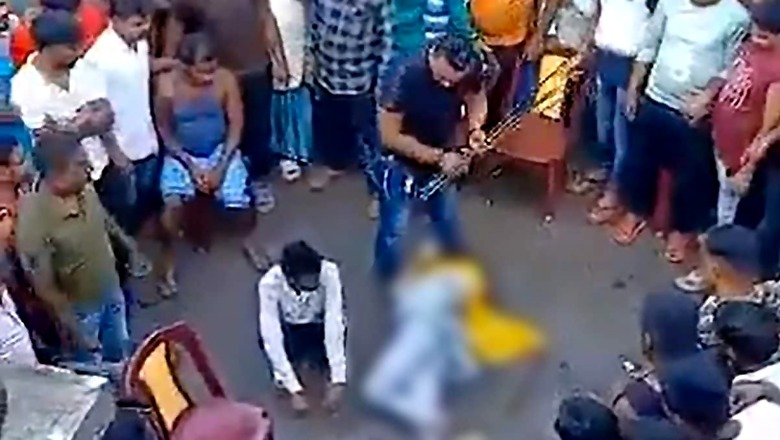
views
The brutal acts have sparked condemnation and brought renewed attention to the issue of kangaroo courts and their unchecked authority in rural areas. However, kangaroo courts, especially those targeting women, are entrenched in West Bengal and neighbouring eastern states like Jharkhand, Bihar, and Odisha.
Unfortunately, this form of ‘instant societal justice’ is not exclusive to a region or a few states, but is almost a pan-India phenomenon. In Bengal, it is called ‘salishi sabha’, while in North India, it is known as ‘Khap Panchayat’ and so on.
Delivery of ‘instant justice’
These extrajudicial ways to deliver “instant justice” have been a prevalent practice across the rural hinterlands in the country. The informal justice system led by village-heads or local politicians thrives in rural areas where formal justice systems are inaccessible, slow, or expensive.
Political parties and local administrations frequently turn a blind eye, fearing the loss of electoral support if they interfere with these traditional practices. This tacit approval perpetuates a cycle of instant — and often brutal — “justice” that undermines the rule of law and disproportionately affects vulnerable women.
While the public flogging of a woman is at the fore now, Bengal witnessed another brutal form of such kangaroo courts in Birbhum’s Labpur in 2014 when a 20-year-old tribal woman was gang-raped by 13 men on the orders of the kangaroo court. The woman was punished for having an affair with a Muslim man. The court penalised the family and asked them to deposit Rs 20,000. When the family failed to deposit the money, the village head ordered the gang rape of the woman.
Cultural traditions and societal norms often lend these informal courts a semblance of legitimacy, perpetuating their existence. This is why some states still witness kangaroo courts that brand women as ‘witches’, punish some for ‘extramarital’ or ‘inter-faith’ marriages, penalise some for alleged ‘child-lifting’ and sometime also order ‘lynching’ in areas like Jharkhand, Bihar and Bengal.
Nyaya Panchayats, Shanti committees, Salishi Sabha
The partition of Bengal in 1947 caused massive upheaval, uprooting countless families overnight. Those who were displaced left indelible imprints on the collective psyche of Bengal. This traumatic event shaped their view of law and courts of justice, leading to a complex perception of justice and protection.
In the wake of the Partition, those evicted found themselves living in refugee colonies where colony committees emerged as protectors, stepping in where formal administration and institutions failed. These committees often took on the roles of vigilantes, administering justice through local bodies known as salishi sabha.
Meanwhile, tribal-dominated societies in Jharkhand and Bengal have a different cultural-traditional societal justice system as they want to be away from the purview of the formal criminal justice system.
In 1973, a significant attempt was made to formalise these informal systems with the Panchayat Act, which included a provision of ‘Nyaya Panchayats’. This move aimed to legitimise the ‘salishi’ system by incorporating it into an informal justice framework for the villagers. The Nyaya Panchayat system was never implemented. However, the Left Front rule saw several “peace committees” in localities which included a member of local police station, administration and Panchayats.
Despite these efforts, the sense of justice delivered by these local bodies has remained largely unchanged, continuing to reflect the deep-seated community values and the need for swift, accessible justice outside the formal legal system.
Khaps, Salishi Sabha: Interplay of formal-informal justice system
The coexistence of Khap Panchayats, Salishi Sabha and Gram Panchayats reveal the complexities of political society and party affiliations, where caste and local loyalties play a crucial role in shaping people’s vision of justice and governance. This dynamic interplay often leads to a dual system of justice: one that is formal and state-sanctioned, and another that is informal but deeply rooted in local traditions and power structures.
Historically, similar conflicts have existed in the pre-Independence era as well.
For instance, in 1870, the British colonial administration established the Shanti Committee and the Chaukidari Panchayati, attempting to integrate traditional community leaders into a formal law enforcement framework. However, these efforts often proved to be incompatible with the established norms and practices of local communities and it led to tension between pre-modern institutions and the forces of modernity.
This tension remains evident today as Khap Panchayats and other informal bodies continue to operate outside the formal legal system. They are seen as anathema to modern legal principles, often resulting in decisions that are ill-recognised by state authorities but hold significant sway within their communities.
The interplay among such state panchayats, Salishi Sabhas and Khap Panchayats explains the ongoing struggle to balance traditional forms of justice with the demands of a modern legal framework, influenced by political, social, and cultural factors that shape the rural areas in the country.



















Comments
0 comment